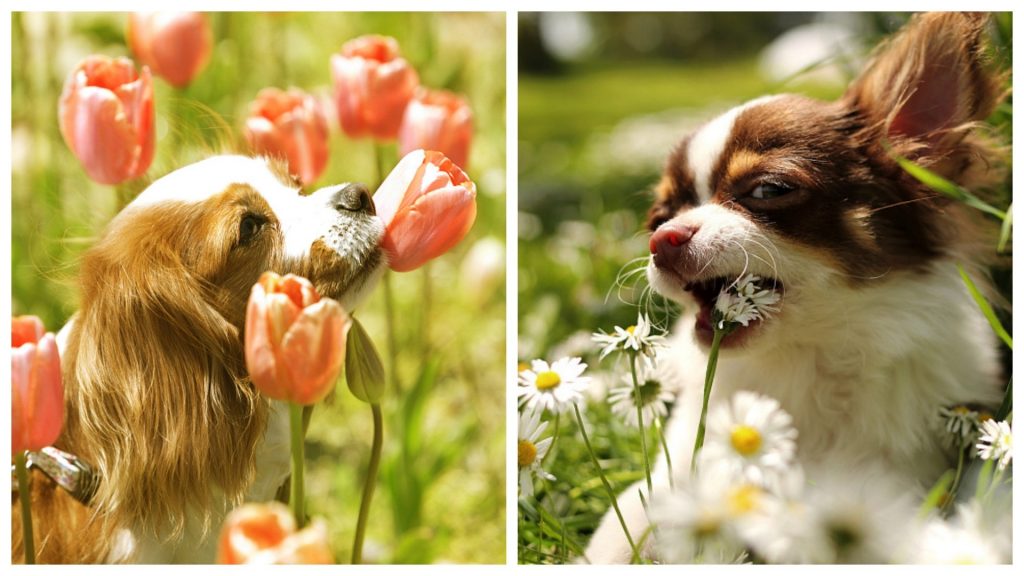As spring arrives in Cardiff and flowers bloom in the parks, are dog owners aware of the risks some flowers pose if their pets ingest them?

As spring brings new life to Cardiff’s parks, dog owners are enjoying the warm weather and blooming flowers. The longer days and the blossoming of colorful flowers make it the perfect time to take pets outdoors.
Cardiff’s parks are filled with vibrant displays of tulips, daffodils, and hyacinths, creating an inviting atmosphere for both humans and their furry companions. However, beneath the beauty of these flowers lies an often overlooked danger.
While many pet owners are aware of the potential risks, many are not fully informed of the dangers these flowers pose to their pets. In Cardiff, especially in public spaces like Bute Park, the risk is higher due to the prevalence of such toxic plants. Their bright colors and strong smells can easily catch the attention of curious dogs, leading them to ingest the harmful plants.
The high cost of treatment puts a heavy financial burden on pet owners. As some pet insurance in the UK does not fully cover all treatment costs, pet owners often have to pay a hefty bill themselves in the face of an emergency.

According to the Insurance Institute of Britain, the average claim for pet insurance in the UK is now more than £800. The more serious the illness, the more expensive it is. If a dog needs emergency treatment for accidentally eating toxic plants, the cost can reach hundreds of pounds, which can be a heavy financial burden for pet owners.
Sarah Cockwill, who owns an eight-year-old spaniel, shared her concerns about the rising costs of pet care. “Although insurance helps, you often need to pay upfront,” she explained. “There’s rarely an option to pay in instalments, which makes emergency treatments a real financial challenge for some.”
Some pet owners often struggle to pay for expensive treatment before they can get an insurance claim, and in such emergencies many face the dilemma of choosing between their pet’s health and their own financial ability.
In addition to the immediate treatment costs, pet owners also face the challenge of coping with ongoing expenses for care. “Veterinary fees usually need to be paid in full upfront, which adds to the financial pressure, particularly for those with lower incomes,” said Cockwill.
For pet owners who don’t have emergency funds, the cost of medication, follow-up and other extra care can be a huge financial burden.

This is particularly worrying for elderly pets or pet owners with a history of illness, as these animals often require more frequent veterinary care. Emergency treatment for plant poisoning can sometimes develop into long-term care, further increasing the financial burden on the owner.
“In some cases, the pet may need to stay in the veterinary clinic for observation, which adds further to the cost,” said Rachel Bean,a canine safety expert. “It’s important for owners to understand the potential financial burden of owning a pet, particularly during the spring season when plant poisoning incidents are more common.”
To reduce these risks, experts advise dog owners to be especially careful to keep their dogs away from flower beds in the spring. Curiosity is a natural trait of dogs. Bright flowers and strong fragrances can attract them, which may lead to them biting toxic bulbs or petals, posing health risks.
“Dogs are drawn to new smells and bright colors, which can make certain plants very tempting for them,” explained Rachel. “Being proactive about keeping your dog on a lead near these plants can help prevent accidents.”
“If you suspect your dog has ingested a toxic plant, it is essential to remove any remaining plant matter and try to identify the plant (or take a photo),” advised Rachel. “Different plants require different treatments, and you should never induce vomiting unless directed by a veterinary professional.”
Early intervention is key to minimizing the damage caused by plant poisoning, and being able to provide the veterinarian with as much information as possible will help them to deliver the best care for your pet.
For pet owners facing financial difficulties, free veterinary support is available. “If your dog is in an emergency situation and you can’t afford private treatment, PDSA can help,” said Cockwill.
“They provide low-cost or free treatment for eligible pet owners.” Other organizations, such as the Blue Cross, also offer similar services, ensuring that financial constraints do not prevent pet owners from seeking urgent care for their animals.

As spring continues to bloom, Cardiff’s parks and green spaces offer plenty of opportunities for outdoor enjoyment. Experts advise pet owners not to ignore the risks posed by toxic plants. When walking your dog in the park, be aware of hidden dangers that can lead to high medical bills, and learn preventive measures in advance to keep your pet safe.
Veterinary care is essential, but comes at a high cost, “said Faith Tagg, a pet insurance expert. It is important for pet owners to be aware of the plants around them and take measures to protect their pets from harm.
As long as pet owners pay more attention and take precautions, they can avoid pet poisoning and high emergency veterinary costs.
After all, taking your pet for a walk in the park is meant to be enjoyable, but understanding the potential risks and preparing in advance can make the time safe and fun for both the pet and the owner.
